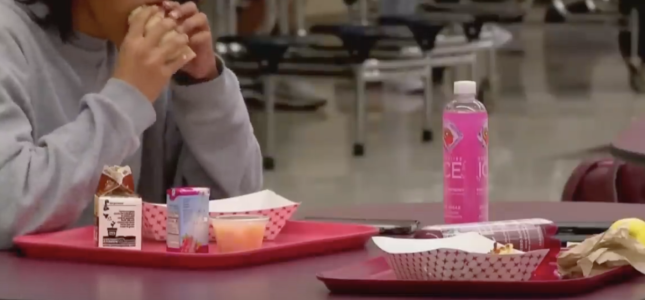The mastermind behind the COVID food scam that's too shocking to believe – trial details inside
- Replies 0
In a world where the COVID-19 pandemic has already caused so much loss and hardship, it's hard to imagine that anyone would take advantage of the situation for personal gain.
Yet, the trial that's unfolding in Minneapolis is revealing just how audacious and extensive such a scheme can be.
The case, which has gripped the nation, centers around an alleged massive fraud that exploited programs meant to feed children during the pandemic. What do you need to know?
At the heart of the trial are Aimee Bock, the founder and former executive director of the now-defunct nonprofit Feeding Our Future, and Salim Said, a former restaurant owner.
They stand accused of orchestrating a $250 million conspiracy to defraud taxpayer-funded child nutrition programs. This case is not just a local news story; it's being called the largest COVID-related fraud scheme in the country by the Minnesota US Attorney’s Office.

The allegations are as complex as they are disturbing. Prosecutors claim that Bock's organization was the epicenter of the fraud, which ballooned Feeding Our Future's revenue to nearly $200 million in 2021—up from $3.4 million before the pandemic.
This staggering increase in funds was allegedly obtained through fraudulent claims for meal reimbursements.
The government's case paints a picture of a well-orchestrated operation that took advantage of relaxed regulations and oversight during the pandemic. They have a 102-page list of exhibits that include the meal count sheets from Safari Restaurant that Said allegedly used to claim reimbursement for 6,000 meals that were “served to children every day throughout January 2021.”
Restaurants, including Said's Safari Restaurant, were allowed to serve as meal sites when traditional venues for subsidized meals closed. This, combined with alleged lax oversight from the Minnesota Department of Education, allowed the fraud to flourish.
Nearly half of the 70 people charged since 2022 have pleaded guilty, including Abdulkadir Nur Salah and his brother, Abdi Nur Salah, who were set to stand trial alongside Bock and Said.
The guilty pleas and the ongoing trials are a testament to the scale of the investigation and the seriousness of the charges.
The defense is expected to argue that real food was provided to real children, but prosecutors maintain that any legitimate services were merely a front for the fraudulent claims.
The trial is set to feature extensive evidence, including emails, canceled checks, and allegedly falsified documents such as alleged fake food invoices, attendance rosters, and meal count sheets.
Source: CBS Evening News / Youtube.

How can we work together to prevent such exploitation in the future? What measures can be taken to restore trust in vital public services? Share your thoughts and experiences in the comments below!
Yet, the trial that's unfolding in Minneapolis is revealing just how audacious and extensive such a scheme can be.
The case, which has gripped the nation, centers around an alleged massive fraud that exploited programs meant to feed children during the pandemic. What do you need to know?
At the heart of the trial are Aimee Bock, the founder and former executive director of the now-defunct nonprofit Feeding Our Future, and Salim Said, a former restaurant owner.
They stand accused of orchestrating a $250 million conspiracy to defraud taxpayer-funded child nutrition programs. This case is not just a local news story; it's being called the largest COVID-related fraud scheme in the country by the Minnesota US Attorney’s Office.

Aimee Bock, the founder and former executive director of Feeding Our Future, is facing trial for her alleged role in a massive COVID-related fraud scheme. Image source: CBS Evening News / Youtube.
The allegations are as complex as they are disturbing. Prosecutors claim that Bock's organization was the epicenter of the fraud, which ballooned Feeding Our Future's revenue to nearly $200 million in 2021—up from $3.4 million before the pandemic.
This staggering increase in funds was allegedly obtained through fraudulent claims for meal reimbursements.
The government's case paints a picture of a well-orchestrated operation that took advantage of relaxed regulations and oversight during the pandemic. They have a 102-page list of exhibits that include the meal count sheets from Safari Restaurant that Said allegedly used to claim reimbursement for 6,000 meals that were “served to children every day throughout January 2021.”
Restaurants, including Said's Safari Restaurant, were allowed to serve as meal sites when traditional venues for subsidized meals closed. This, combined with alleged lax oversight from the Minnesota Department of Education, allowed the fraud to flourish.
Nearly half of the 70 people charged since 2022 have pleaded guilty, including Abdulkadir Nur Salah and his brother, Abdi Nur Salah, who were set to stand trial alongside Bock and Said.
The guilty pleas and the ongoing trials are a testament to the scale of the investigation and the seriousness of the charges.
The defense is expected to argue that real food was provided to real children, but prosecutors maintain that any legitimate services were merely a front for the fraudulent claims.
The trial is set to feature extensive evidence, including emails, canceled checks, and allegedly falsified documents such as alleged fake food invoices, attendance rosters, and meal count sheets.
Source: CBS Evening News / Youtube.
Key Takeaways
- Aimee Bock, the founder and former executive director of Feeding Our Future, is facing trial for her alleged role in a massive COVID-related fraud scheme.
- Prosecutors accuse Bock's organisation of being at the centre of a $250 million conspiracy to defraud child nutrition programs during the pandemic.
- Nearly half of the individuals charged in connection with the case have entered guilty pleas, and trials for the remaining defendants are scheduled through the end of December.
- The case involves allegations of fraudulent meal count sheets and extravagant spending of proceeds on vehicles, luxury travel, and real estate, although the defendants claim they provided real food to children.
How can we work together to prevent such exploitation in the future? What measures can be taken to restore trust in vital public services? Share your thoughts and experiences in the comments below!






